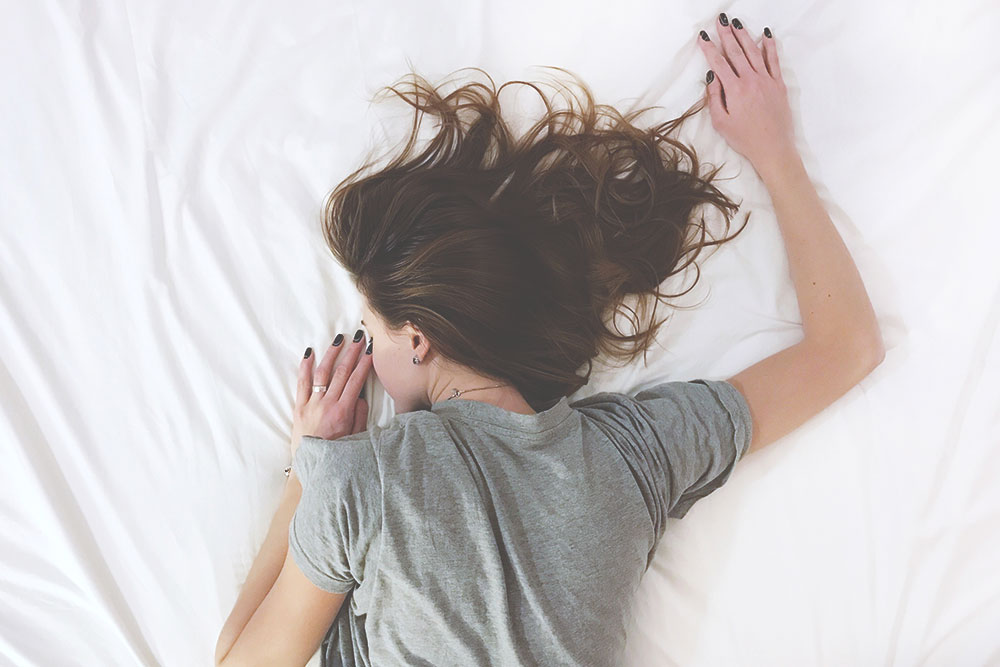Do you have a routine that helps you settle in at the end of the day? Here are 5 ways to unwind for a better night’s rest tonight.
BY: KATHERINE RATLIFF, MS, RDN
When we talk about sleep, what often never gets mentioned is the psychological component:
the impact that anxiety and negative thoughts can have on our ability to sleep, restfully.
Developing a sleep hygiene routine that includes a way to address any stress or anxiety we may be experiencing is so important. We can have the best sleep routine, but if we go to bed worried about what the next day will bring, our sleep will inevitably be impacted.
But first, what is sleep hygiene?
In simple terms, sleep hygiene is a set of practices and behaviors intended to promote a good night’s sleep. Having healthy sleep habits can improve your sleep quality, allowing you to feel rested and recharged for the day ahead. The following 5 strategies will help you to create your own sleep hygiene routine:
1. MAKE YOUR BEDROOM A PEACEFUL SANCTUARY
Most sleep experts recommend that your bedroom be used for two things: sleep and sex. To that end, keep all electronics, including the TV, computer, alarm clock, and phone, in other rooms. If you absolutely need your phone nearby – make sure it’s on night mode and do-not-disturb, if possible.
When it comes to sleeping, our bodies are quite sensitive to temperature variations. Keep your bedroom at a temperature that welcomes sleep (60-65 F). If you are too hot or too cold, you may find it more challenging to fall asleep.
2. ESTABLISH AN EVENING – AND MORNING – ROUTINE
A regular sleep schedule – during the week and on the weekends – has been found to be most effective for quality sleep. Creating an evening routine can help you establish this consistency. Try turning off all electronics at least 60 minutes before bed. End your evening with a gratitude session or meditation. If you have a lot on your mind, try journaling your thoughts or writing out what you need to do the next day.
Upon waking, find natural daylight. Go on a walk, drink your glass of water outside, or face your desk toward the window. Bringing in the natural daylight helps your body recognize that it’s morning – allowing your sleep and stress hormones to calibrate.
3. LIMIT ALCOHOL, CAFFEINE, AND SUGAR
The big three (alcohol, caffeine, and sugar) can all negatively impact your sleep when not in balance. Research has shown that both alcohol and sugar (e.g. highly processed snacks) can interfere with your body’s ability to stay asleep. Likewise, caffeine that’s consumed too late in the day can interfere with the body’s ability to fall asleep.
Try limiting caffeine to the first half of the day and enjoy a balanced evening snack (see #4) for quality sleep. If you find you are sensitive to alcohol, try limiting your intake a few days and see if this improves your sleep.
4. ENJOY AN EVENING SNACK
Although highly processed snacks (desserts, white breads/crackers) in the evening may interfere with sleep, having a balanced snack of carbohydrate, protein, and other nutrients can actually help you sleep even better!
Tryptophan, an amino acid (i.e. building block of protein), is the precursor to melatonin, our sleep hormone. Including tryptophan-rich protein sources may help facilitate the production of melatonin to help you sleep soundly. Additionally, having a balanced snack in the evening, keeps your blood sugar levels stable, so you won’t wake up hungry at night with low blood sugar (nocturnal hypoglycemia – fun word, huh?!). Here are a few balanced, tryptophan-rich snack ideas:
- Plain greek yogurt with berries
- Sliced turkey and cucumbers
- Apple slices with almond butter and dark chocolate pieces
- Popcorn with coconut oil, pumpkin seeds, and dark chocolate
5. EXERCISE REGULARLY
Frequent exercise (aka joyful movement) isn’t just about improving your cardiovascular endurance… it can also help with your sleep! Although the mechanism is unclear, research has consistently shown that regular exercise can help improve sleep quality and duration.
The type of exercise doesn’t matter as much as the consistency. Aim for 150 minutes of moderate-intensity exercise each week. To maximize sleep benefits, try to leave a 3-4 hour window between your workout and bedtime.
Sleep well, my friends!
Adapted from the original article.
HEADER IMAGE: VLADISLAV MUSLAKOV
Katherine Ratliff, MS, RDN is a Minneapolis-based Registered Dietitian with a passion for transforming food into simple, delicious, and nourishing meals. She believes the path to health and happiness comes from focusing on foods that help nourish, heal and grow. By focusing on the six pillars of health, Katherine helps others create vibrant and meaningful lives. To read more, visit her at At Katherine’s Table.

